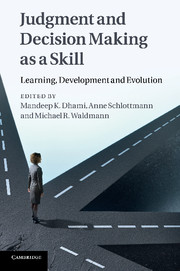Book contents
- Frontmatter
- Contents
- Figures
- Contributors
- Preface
- Acknowledgments
- Chapter cross-reference table
- Part I Evolutionary and neural bases of JDM
- Part II Developmental approaches to JDM
- Part III Learning JDM
- 6 Learning of judgment and decision-making strategies
- 7 Causal models in judgment and decision making
- 8 Learning judgment and decision making from feedback
- Part IV Improving and aiding JDM
- Conclusion
- Index
- References
6 - Learning of judgment and decision-making strategies
Published online by Cambridge University Press: 05 December 2011
- Frontmatter
- Contents
- Figures
- Contributors
- Preface
- Acknowledgments
- Chapter cross-reference table
- Part I Evolutionary and neural bases of JDM
- Part II Developmental approaches to JDM
- Part III Learning JDM
- 6 Learning of judgment and decision-making strategies
- 7 Causal models in judgment and decision making
- 8 Learning judgment and decision making from feedback
- Part IV Improving and aiding JDM
- Conclusion
- Index
- References
Summary
Introduction
People learn many skills throughout their lives, such as how to drive a car, roast a turkey, or identify people whom they can trust. People not only learn through the help of parents, teachers, and books, but also often simply on the basis of personal experience. The goal of the present chapter is to show how models of bounded rationality benefit from considering individual learning processes to explain people’s decision skills. Learning is a “missing link” in decision-making research because it provides an explanation of how people are able to adapt their decision making to specific situations.
In this chapter we first present an overview of the bounded rationality approaches that have largely neglected learning when accounting for people’s decision-making processes. Second, we present models of learning that address how people can learn the values of options and decision strategies. Overall, we aim to show that learning can account for individuals adapting their choices to the statistical structure of environments. This adaptation takes place either directly, by changing people’s preferences for the available choice options, or indirectly, by changing people’s preferences for the decision strategies that determine the choice between options. At the end of the chapter, we discuss the connection of learning and decision making to extant neuroscience research and, more generally, the opportunities afforded by, and limitations of, the learning perspective on decision making.
Information
- Type
- Chapter
- Information
- Judgment and Decision Making as a SkillLearning, Development and Evolution, pp. 143 - 168Publisher: Cambridge University PressPrint publication year: 2011
